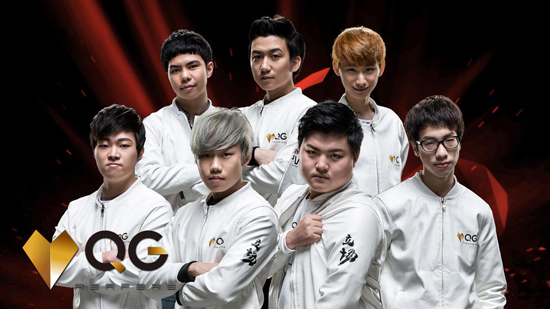Exploring the weaknesses of Chinese League of Legends

There are two fun things about being on two different power ranking panels: one, to see how community figures talk about teams and players behind closed doors and a signed NDA (the specifics of which I can't go into detail on—I signed it too).
The second fun thing is comparing what goes on within those closed discussioned with the wild speculation that power rankings conjure from the audience as a whole.
Yes, it's true—bias exists. Though never quite in the form the audience assumes it does, nor from the panelist they think it comes from (unless it's an LMS team suspiciously far up—I take full credit and/or blame for that). To shed the tiniest amount of light on an otherwise deliberately obscure process: favoritism for any one team or region is usually the most erroneous audience assumption. Rather than jockeying with each other for the chance to increase their region's prestige, regional panelists tend to be the most critical of their teams—after all, nobody knows their flaws and shortcomings better (which is why COUGAR E-Sports will remain dead last so long as I draw breath).
There's even a tiny amount of envy involved when the international comparisons are made. Just as the grass is always greener on the other side, so is the team-fighting better coordinated, the individual mechanics sharper, and the map play more strategically sound. Furthermore, comparative strengths are cast in the context of prior tournament winners—most of which have been Korean, which admittedly sets an extremely high standard across the board.
The biggest contention right now, with IEM starting this week, is whether the Chinese teams—and QG Reapers in particular—have been given a fair shake. If you've been watching the LPL, they mostly have.
Hitting the weak point
Chinese team QG Reapers, as with the Immortals, ROX Tigers, and ahq e-Sports Club, went the first half of the spring split without dropping a single set. In fact, unlike the ROX Tigers, they didn't even drop a game among their sets until fairly recently. Cast in the context of China's stereotypically hyperviolent and extremely volatile metagame, a team has to be something extraordinary indeed to achieve such consistency—or, alternatively, there has to be a crucial region-wide habit that they're uniquely exploiting.
In China's case, their regional preference for heavy brawling, originally a characteristic of the once overwhelmingly dominant OMG, makes for a primitive map control game. Historically, their most impressive international performances have come as a result of forcing an emphasis on mechanics: the 4v0 lanes of Worlds 2013, for instance, isn't some great feat of strategic timing and canny scouting—it simply forces teams to either fight China on their own terms, or give up free map gold. Uzi, the single most successful Chinese player in terms of international results, built his fame off of 2v2 outplays and gung-ho dueling.
Keep up to date with the most important stories and the best deals, as picked by the PC Gamer team.
QG's strategies this year are the polar opposite of that traditional style: instead of relying on early-game power spikes, they vastly prefer scaling options like Viktor and Ezreal and forcing laneswaps—all the better to feed AD carry Peco with. They'll deliberately allow a team to take the turret out from under Peco so that the minion wave can be frozen on their side of the map, allowing their carries to farm up until later in the game, neutralizing their rivals' aggressive strategies while giving them a significant advantage when the death timers are longer.
In short, QG is the only Chinese team playing to the current meta, and their losses so far have been a result of switching away from that—it's not that Uzi sucks now that he's on QG, but that his early-game strengths are actually a liability under the team's current strategy. Yet it's this same strength that has them rated so unfavorably when compared abroad.
Frontrunner fallacy
The problem is that everybody else has been playing the laneswap meta for ages now, and QG's actually looks pretty bad in comparison. The lane freeze to pump Peco full of steroids isn't flawless: team strategies based less around seeking advantages through team fights and more about taking turrets, for instance, leaves QG trying to defend objectives at a numerical disadvantage against teams that are increasingly using double (or even triple) AD carry compositions. Not only do turrets tend to fall extremely quickly when everybody's building some form of attack speed, but that also neatly neutralizes QG's scaling advantages too.
The tower emphasis compounds QG's issues as well. Current laneswap strategies are based on tower trades in quick succession to stay on top of each other's global gold—a stark contrast to QG's freeze method. While the Chinese style does make for one extremely fed carry, it indirectly starves everybody else on the team—and 4v5 fights are extremely unpleasant when you're not just lacking a player, but also collectively down an item compared to your counterparts.
The most extreme version of this: Counter Logic Gaming, whose ‘Darshan vs The World’ strategy has made them the west's highest authority on how to play the 4v4 and 4v5 game to near-perfection. CLG's splitpush timing is something that QG has never had to deal with before—simultaneous objective prioritization designed to stretch them across the map and allow Darshan's dueling champion to pick fights with Peco at will. And Peco isn't going to be winning mid- and late-game fights into Quinn or Fiora. But at least CLG offers some hope that QG can find and outplay individual players to take the pressure off—Huhi and Stixxay, in particular, are the most exploitable vulnerabilities on the North American team's roster.
Less hope exists in the face of SKT T1, even as the Korean team struggles domestically. Blank replacing Bengi for IEM may or may not be an issue—but outplaying Faker has historically been presumptuous at best, and SKT T1 has proven before that their struggles at home doesn't stop them from flawlessly sweeping international tournaments.
That does raise an important question: what would it take for QG, and China by extension, to be warranted more competitive merit? And the answer to that is "pulling an OMG." Just as OMG's 2013 dominance left a permanent mark on the character of Chinese League of Legends, QG's current dominance should by all rights force teams to (eventually) adapt to them. Their expected failures at IEM will provide a playbook for that purposes—and set the foundation for China's Worlds bid in October.

PC Gamer Pro is dedicated to esports and competitive gaming. Check back every day for exciting, fun and informative articles about League of Legends, Dota 2, Hearthstone, CS:GO and more. GL HF!

